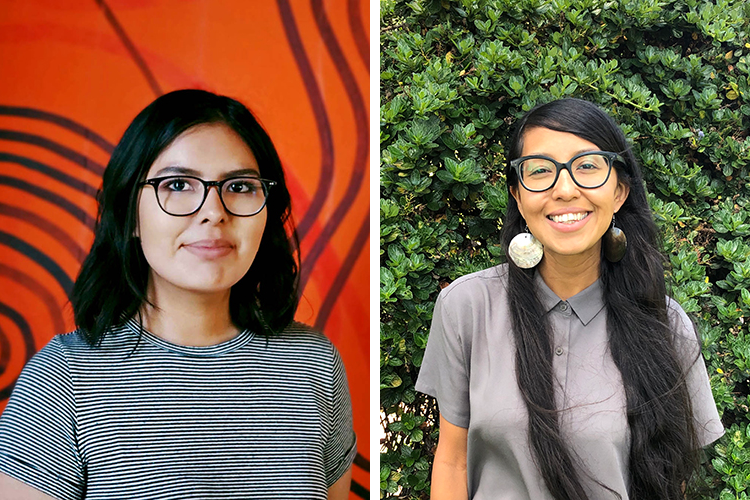Berkeley Talks: ‘Indigenous United’ podcast hosts on NAGPRA and Berkeley
Graduate students Sierra Edd (Diné) and Ataya Cesspooch reflect on the history and future of the Hearst Museum and Berkeley’s relationships with Indigenous communities.
August 13, 2021
Subscribe to Berkeley Talks, a Berkeley News podcast that features lectures and conversations at UC Berkeley.

Sierra Edd (Diné) (left) and Ataya Cesspooch are graduate students at UC Berkeley and co-hosts of Native American Student Development’s podcast, Indigenous United. (Photos courtesy of Sierra Edd (Diné) and Ataya Cesspooch)
In episode 121 of Berkeley Talks, graduate students Sierra Edd (Diné) and Ataya Cesspooch talk about their experiences at UC Berkeley as Native American students and reflect on the history and future of the campus’s Phoebe A. Hearst Museum of Anthropology and Berkeley’s relationships with Indigenous communities.
Edd and Cesspooch are co-hosts of Indigenous United, a podcast from Native American Student Development at Berkeley that explores Indigenous issues through interviews with Native artists, scholars and activists. As part of the podcast, the co-hosts did a three-part series about the Native American Graves Protection and Repatriation Act of 1990 (NAGPRA), with one episode focusing on Hearst Museum’s history with the act.
“We knew that there were thousands of ancestors being held by the Hearst,” said Cesspooch, a Ph.D. student in environmental science, policy and management with a designated emphasis in Indigenous language revitalization. “And we also knew that NAGPRA … was passed in 1990 and that it required institutions to complete inventories of what Native American belongings or ancestors that they were holding and also to repatriate them, to give them back to the Indigenous communities that they belong to so that they can be properly buried.”
“And so, knowing that and knowing how many thousands of ancestors that the Hearst had,” she continued, “we wanted to know how that happened. How was the Hearst not returning these ancestors? How did the collection grow to be over 9,000? We just had a lot of questions and a lot of the other students we talked to really didn’t know the history either. We all knew that there were thousands, but we didn’t know how that had happened, how that came to be. So, that was what we were really interested in digging into for the podcast.”
This July 22, 2021, talk is the third in a series of conversations that focuses on the history and future of the Hearst Museum and UC Berkeley’s relationships with Indigenous communities. Featuring speakers from within and beyond the campus, the series centers on ongoing projects leveraging UC’s institutional power, historically a source of harm, to further Indigenous sovereignty and environmental justice.
Listen to more episodes of Indigenous United on Apple Podcasts or SoundCloud.
Learn more about Indigenous United on Native American Student Development’s website.
Find upcoming events and watch past talks sponsored by the Hearst Museum.